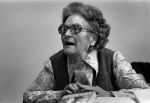Federica Montseny
Biography
Born to an anarchist family, her life as an activist, writer and politician began in her own family. Her parents (who used the aliases of Federico Urales and Soledad Gustavo, for reasons of secrecy) founded and ran the magazine “Revista Blanca”, which was the theoretical body of Spanish anarchism to which Federica collaborated, publishing more than 600 articles. From a very young age she participated in the anarchist labour union movement, being politically active in the CNT-AIT (National Confederation of Labour – International Workers Association). Her talent as a speaker enabled her to take part in public discourses from a very young age.
She defended the purest principles of anarchism, but, paradoxically, became the first female minister in the history of Spain and Western Europe. Before her, there had only been female ministers in the Soviet Union. Together with three other anarchists, she joined Largo Caballero’s government for a brief period during the Spanish Civil War between 1936-1937, as Minister of Health and Social Welfare. During those months, she drove forward the first decree to decriminalise abortion in Spain. No similar decree would exist in Spain again until the 1985 law. She thus became the first female minister in Spain and Western Europe, since in other parts of Europe Alexandra Kollontai (USSR) and Miina Sillanpää (Finland) had already held this position.
Her position regarding the feminist movement was very controversial. She was against the existence of exclusively female associations, and the existence of the powerful “Mujeres Libres” (free women) of Spanish women anarchists. Her emphatic speeches led her to state and write the famous phrase "feminismo nunca!! humanismo siempre" (“Feminism never!! Humanism forever!”), which was used a lot to criticise the free women movement in Spain. Mary Nash carried out an excelled philosophical analysis of Federica’s thinking in this respect (see sources).
After the Civil War she went into exile in France and returned to Spain during the transition, to collaborate in the reconstruction of the CNT. She always had a “pure” anarchist line of thought, compared to anarchist union members and those who supported the creation of parties or participation in institutions, such as Ángel Pestaña, with whom she was good friends.
Chronology
She was born in Madrid, Spain, on 12th February 1905. From a very young age, she was familiar with repression, as her parents lived in secrecy. She began to write in 1921, aged just 16 years old, and published her first short novel, called Horas Trágicas (Tragic Hours). In 1923 she began to contribute to the magazines Solidaridad Obrera and La Revista Blanca and she did so until 1936. Her first long novel, La Victoria (Victory), was published in 1925.
In 1930 she married Germinal Esgleas, another anarchist union member and together they had three children: Vida (1933), Germinal (1938) and Blanca (1942).
In 1931 she joined the CNT, in which over the following years she would have a main role on account of her talent as a speaker, among other reasons. In 1932 she embarked on a propaganda tour through Andalusia that later extended to Spain, and the following year she took part in a protest in Paris, on the repression in Casas Viejas.
However, her most prominent role was in 1936, when she took part in the CNT Congress in Zaragoza, collaborating in the speech about libertarian communism and participating as one of the speakers at the closing ceremony of the political meeting. When the war broke out she joined the peninsular committee of the FAI (Iberian Anarchist Federation) and the national committee of the CNT. In November of that same year, she was appointed Minister of Health and Social Welfare of the Republic government, a position she accepted despite having declared herself anti-government and her initial doubts. Her colleagues in the government of Largo Caballero were Juan García Oliver (Justice), Juan Peiró (Industry) and Juan López (Trade).
She frequently returned to Spain during the transition to collaborate in the reconstruction of the CNT and made several public appearances in political meetings and on television programmes (see sources). Federica died in exile in Toulouse (France) in 1994. The Health Minister at the time, Ángeles Amador, was the only representative of the Spanish government at her funeral.
Sources
-
http://www.centrefedericamontseny.org/index.php?accion=portada
-
Programme of interviews with Federica Montseny on TVE:
-
http://www.youtube.com/watch?feature=player_embedded&v=57bKomGdNgk
-
ALCALDE, C. Federica Montseny. Barcelona, Ed. Vergara, 1983
-
LOZANO, Irene. Federica Montseny. Una anarquista en el poder. Madrid, Espasa, 2004.
-
Dos intelectuales anarquistas frente al problema de la mujer: Federica Montseny y Lucía Sánchez Saornil (Two anarchist intellectuals against women’s problems: Federica Montseny and Lucía Sánchez Saornil. Mary Nash. Convivium philosophy magazine, available at
-
http://www.raco.cat/index.php/Convivium/article/view/76472/98639
-
http://saavedrafajardo.um.es/WEB/archivos/respublica/numeros/20/12.pdf
-
http://www.dbd.cat/index.php?option=com_biografies&view=biografia&id=181
Photo:
- Manel Armengol. CC BY-SA 2.0. Wikimedia Commons. http://es.wikipedia.org/wiki/Federica_Montseny#mediaviewer/File:FEDERICA_MONTSENY.jpg




